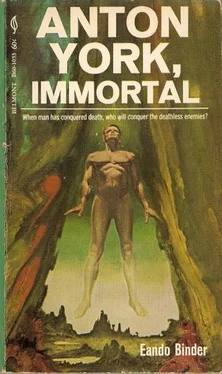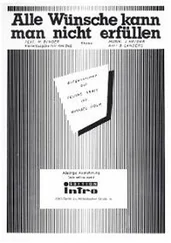Eando Binder - Anton York, Immortal
Здесь есть возможность читать онлайн «Eando Binder - Anton York, Immortal» весь текст электронной книги совершенно бесплатно (целиком полную версию без сокращений). В некоторых случаях можно слушать аудио, скачать через торрент в формате fb2 и присутствует краткое содержание. Год выпуска: 1965, Издательство: Belmont, Жанр: Фантастика и фэнтези, на английском языке. Описание произведения, (предисловие) а так же отзывы посетителей доступны на портале библиотеки ЛибКат.
- Название:Anton York, Immortal
- Автор:
- Издательство:Belmont
- Жанр:
- Год:1965
- ISBN:нет данных
- Рейтинг книги:5 / 5. Голосов: 1
-
Избранное:Добавить в избранное
- Отзывы:
-
Ваша оценка:
- 100
- 1
- 2
- 3
- 4
- 5
Anton York, Immortal: краткое содержание, описание и аннотация
Предлагаем к чтению аннотацию, описание, краткое содержание или предисловие (зависит от того, что написал сам автор книги «Anton York, Immortal»). Если вы не нашли необходимую информацию о книге — напишите в комментариях, мы постараемся отыскать её.
A science fiction classic!
Anton York, Immortal — читать онлайн бесплатно полную книгу (весь текст) целиком
Ниже представлен текст книги, разбитый по страницам. Система сохранения места последней прочитанной страницы, позволяет с удобством читать онлайн бесплатно книгу «Anton York, Immortal», без необходимости каждый раз заново искать на чём Вы остановились. Поставьте закладку, и сможете в любой момент перейти на страницу, на которой закончили чтение.
Интервал:
Закладка:
The thoughtful-eyed man at the nose of the ship barked commands. A microphone carried his voice to all parts of the ship. A thousand men jumped to their duties. The ship’s stern lined itself with Ceres. An invisible bond sprang from ship to asteroid. The ship moved, towing the miniature world with it. The space-tug pointed for Venus and gathered speed.
Ceres, carted those 250,000,000 miles, was installed in an orbit close enough to Venus to allow its brilliant reflection to shine through the misty atmosphere. Thus Venus was given a moon to the delight of its warmth-loving inhabitants. The success of the macro-cosmic engineering feat gave York the same sublime feeling he had had a thousand years before, when he had first realized he was immortal. It was the beginning of a revamping of the Solar System. The astro-engineers of the Cometoid piloted their ship back to the asteroid belt and picked Pallas away. This 300-mile planetoid was given to Mars as a moon, to supplement its two tiny, inconspicuous ones.
Then something else was tried. York, long a lover of the majestic beauties of deep space, knew the value of beauty in man’s life. The brilliant spectacle of Halley’s Comet—faithfully returning every seventy-six years for untold centuries—inspired the next Herculean task. If a comet was such an entrancing panorama when it passed close to Earth or any other planet, why not make this spectacle grander and oftener?
No sooner said than done—with York and his science. Calculations of almost infinite intricacy gave the elements of an orbit that would bring the next comet closely, but neatly, by Earth, Venus and Mars. It was not much of a trick, comparatively speaking, to fasten the end of a force-beam to the comet’s nucleus and drag it into its new track around the Sun.
The first one, unfortunately, was lost in the Sun, but the next eight were more carefully warped into their new grooves of motion. After that, all the peoples of the inner planets—which held the bulk of the Empire’s population—were to be treated to brilliant cometary displays at least once a year.
The Empire applauded this miraculous bit of Universe-building and waited avidly for the next. York next directed his wonder-ship out toward Jupiter. This great planet’s nearest satellite, a small one, was evacuated by its small population and dragged to within two diameters of the primary.
There was some doubt over the issue but finally the giant planet’s gravitational stress obeyed the immutable laws of space and ripped the body to shreds, slowly scattering them in ring formation above its equator. Thus Jupiter had the same halo of glory Saturn had enjoyed for countless ages.
York’s next undertaking was to give Mercury a period of rotation. Burying the end of a force-beam deep within Mercury, as an unshakable anchorage, York diverted the tremendous gravitational stress of the nearby Sun to one side of the planet. York’s ship acted only as the medium of transfer of energy, not as the actual mover. Like the copper wire leading electricity to the motor, York’s engines tapped the cosmic tanks and poured their world-moving powers into the field of operation.
Slowly but certainly the surface of Mercury began to rotate under. the Sun’s rays. Two years of this finally gave the Sun’s first planet a day and night of forty hours each. With the more equal distribution of sun-heat and space-cold on its two formerly unmoving hemispheres, the entire planet was made habitable, instead of just the narrow twilight, zone. It went into the annals of the Empire’s history as a unique experiment in world-moving.
Then York revealed for the first time that he had atomic power available on his ship—the form of energy that had stubbornly defied man’s efforts to pry it loose from its matrix of matter. He must be truly a god, he who had that!
York embarked on the second part of his super project of interplanetary landscaping. Much of Mercury’s surface was given a baptism of supernal fire. Atomic-powered pulveriser-beams transformed its hitherto drab, uninspiring harshness of rock areas into a garden bed of nutritious soil. Hardy plant forms were later to be sown abundantly, to soften the bleakness of the vast calcite plains.
Moving to Venus, York clarified its smoky atmosphere by chemically stripping from it millions of tons of water vapour, carbon dioxide, and the granite dust that arose from its violent wind storms. This took five years, positioned high in the atmosphere, spraying waste products out into space at a speed which insured their departure forever.
Mars was next carefully surveyed, for the purpose of filling its long empty sea bottoms. By repair and extension of its monumental canal system, some polar water had been forced equator ward by the colonists. But only a faint trickle had got into the sea bottom. Warning everyone away from the polar regions, York swung a tremendous heat ray down on the age-old ice.
With a master’s touch, he produced a head of water that snaked over the flat lands and eventually poured into those ancient hollows that may once have floated a lost civilization’s ships, millions of years before. The process, repeated at the other pole, filled the sea bottoms to great depths and duplicated on a miniature scale the oceans of Earth.
All these feats on a planetary scale were measured in years. At times the Cometoid had to be grounded for repairs, refuelling, restocking with supplies and men. For men died in this service, with the passing years, and had to be re placed with younger, fresher forces. But York and Vera, eternally young, knew nothing of the passage of time except as a mathematics of the mortal mind. To them, the rebuilding of the Solar System filled the space of a day in their long, long lives.
York turned the Cometoid’s blunt prow toward the major planets again. Jupiter’s poisonous atmosphere was swept clean of its venomous gases by a series of enormous suction machines, like vacuum cleaners, which converted the obnoxious molecules into solid precipitates that fell to the ground. Because the Jovian planet was such a huge one and its atmosphere so extensive, this cleansing took ten years. But for future ages, people would be able to wander freely over its tremendous surface in their levitation shoes.
Io, Jupiter’s moon, was scoured sweet from its deadly, tenacious fungi by a tongue of protonic flame.
Saturn’s ammoniated atmosphere was suitably neutralized by a two-year belching forth of hydrogen-chloride gas from leviathan gas chambers. York’s chemical stores were all produced by transmutation of nearby and often surrounding raw products.
The bitter coldness of Uranus’ frosty surface was relieved by deep and wide shafts that brought up the planet’s internal heat. York dug the shafts by means of a pillar of livid atomic energy that disintegrated matter at almost the solar rate.
Neptune offered the tricky problem of being completely covered with a hundred-foot layer of solidified and liquefied gases. This had not prevented daring souls from living in this inimical environment in completely self-sufficient arks that floated over these bitter seas. York did not pass the challenge. After all the residents had been warned away, he dropped innumerable bombs of atomic flame deep in the frigid, fluid wastes.
For two years Neptune was a flame in the heavens to rival the Sun as the brilliant atom-fire burned its way through all the surface sea, dissipating most of it into space. The planet’s true surface was revealed for the first time in incalculable ages, to become the dwelling grounds in the future of Earth’s ever pressing hordes.
York carried his mighty tools lastly to remote Pluto, some four billion miles from the Sun. Perhaps in the future, man, who could carry his air and heat with him, might find reason to inhabit this dark and cold planet. Here he chiselled down and smoothed over a surface that had been violently tossed into jagged upheaval by the long-ago interaction of its molten mass and the sudden chill of space.
Читать дальшеИнтервал:
Закладка:
Похожие книги на «Anton York, Immortal»
Представляем Вашему вниманию похожие книги на «Anton York, Immortal» списком для выбора. Мы отобрали схожую по названию и смыслу литературу в надежде предоставить читателям больше вариантов отыскать новые, интересные, ещё непрочитанные произведения.
Обсуждение, отзывы о книге «Anton York, Immortal» и просто собственные мнения читателей. Оставьте ваши комментарии, напишите, что Вы думаете о произведении, его смысле или главных героях. Укажите что конкретно понравилось, а что нет, и почему Вы так считаете.




![Линси Сэндс - Meant to Be Immortal [calibre]](/books/384309/linsi-sends-meant-to-be-immortal-calibre-thumb.webp)







